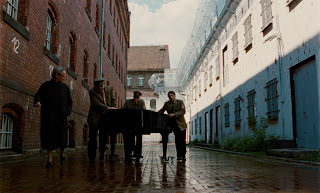

Director: Jong-Jong Yu.
Principal cast: Tae Sattawat, Yu Fa Yang, Tang Jan Gang.
Asian films are generally difficult for me to review since I’m not very familiar with Asian culture. In this case I’m also slightly puzzled. Had this film been made in the West, I probably wouldn’t even review it as I would just file it under „Crap”. However, this film seems to be very popular among gay youngsters in Asia and I can also definitely see why. To begin with, it’s a comedy. If you’re Asian and want to see anything gay-related which is also produced in Asia, in most cases you’ll have to settle for a drama. And Asian dramas are not a laughing matter, although in some cases you would think they were. Secondly, this film openly displays very camp and often barely dressed twinks who occasionally sing, dance or simply parade around in swimming trunks. I don’t think any of the Asian countries have produced many „eye candy” films targeting the male gay audience. And for that alone „Go Go G-Boys!” must be given some credit. I find it very encouraging for the whole region that such films are produced at all. I must also admit that this film gives a rare insight (if only roughly) into the Taiwanese gay subculture of today. And that’s always worth something.
The plot (if we can call it that) evolves around a gay beauty contest called simply G-Boy (yes, in English) and its contestants (whom even the blindest people wouldn’t confuse with straight blokes). While most of them are gay, two join for other reasons. A-Hong’s life is in jeopardy because his girlfriend has worked up a significant debt with the local mob which they strangely enough demand from him, so he joins hoping to win the prize – 10 million Taiwanese dollars (roughly 200,000 EUR). His best mate A-Shin (who is gay) camps him up and also joins the competition. Needless to say, A-Shin has been madly in love with A-Hong since their childhood together and is willing to do anything to help his friend. The other „fake” is Jay, an undercover cop whose worldview seems to have been inspired mostly by action films and anime cartoons and who happens to look very much like the other twinks who’ve joined the competition. Call it a coincidence! Jay volunteers after anonymous death threats are sent to the contest hoping to mimick some of his favourite action heros. However, most of the action in this film is reserved for the relationship between A-Shin and A-Hong who eventually discover their true love – each other. We don’t even get to know who wins the contest in the end. I guess the point is that true love is the winner.
„Go Go G-Boys!” must be following in the footsteps of some sort of Chinese slapstick comedy genre. It is filled with situation comedy elements which are funny enough if you completely disregard the acting (or rather the lack thereof) and if you try to imagine what it must be like being gay in Taiwan (although it must be a lot better than in mainland China, it seems). For example, in one scene the father of one of the contestants arrives from the country with two chickens, which is obviously a great embarrassment to his son, and eventually finds him in bed with another guy. Earlier in the film he was trying to convince his son to start thinking about marriage, now he ends up teaching this other guy (whom he’s no doubt already seeing as his soon-to-be inlaw) how to make a stew with chicken legs. Funny enough, if you think about it!
This film seems to be targeting an audience whom Joey from „Boy Culture” (see my previous review) would call „stage 1 fags” and who according to him „are not slutty hoping to find this perfect boyfriend who’s also not slutty” for about a year after they come out. And although there isn’t anything wrong with that as such, this film has a total soap opera ending to it which I’m not sure even the most romantically inclined among us would find more plausible than most story lines from „Santa Barbara”. But who knows? Maybe this is the sort of ending that is appreciated by the film’s audience in Taiwan and other parts of Asia.
The Taiwanese gay subculture presented in the film seems very effeminite. Everybody looks like a doll and just a personification of campness. Yet, there are numerous references to "Brokeback Mountain" (isn’t Ang Lee from Taiwan originally?) and "The Lord of the Rings". At one point both even collide in a dream. I believe it has always been easier to accept homosexuality in these cultures if the homosexual man behaves and dresses like a woman. Lady boys in Thailand and hijras in India have been traditionally tolerated largely because of this aspect. It seems a lot more difficult to accept a man who behaves and dresses according to the traditional understanding of what men are supposed to be like being gay. I believe this must also be the case in Taiwan. It’s easier to make a camp comedy with exaggeratedly camp, doll-resembling guys than a comedy with ordinary blokes from around the corner. I also believe that campness in itself is perceived as funny. The same way as Mr. Humphries was funny to most people who watched „Are You Being Served?” back in the 1970s. It seems that „Brokeback Mountain” has been sneaked through the back door in this film just to underscore that. And although there is nothing wrong with camp boys in camp comedies (I must admit I quite enjoy them myself), the problem is that it doesn’t do much other than lending a hand to the survival of the cliches about gay men.
"Go Go G-Boys" can be recommended to those of you who would enjoy watching barely dressed Chinese twinks kissing and singing in a camp comedy. It won't rock your world but it will be like having a nice dessert at the end of your meal. To the others I can only say - don't bother!
Here you can watch the film's trailer





